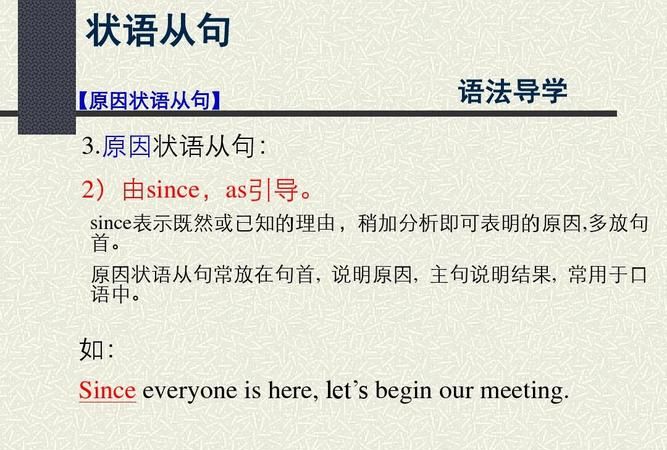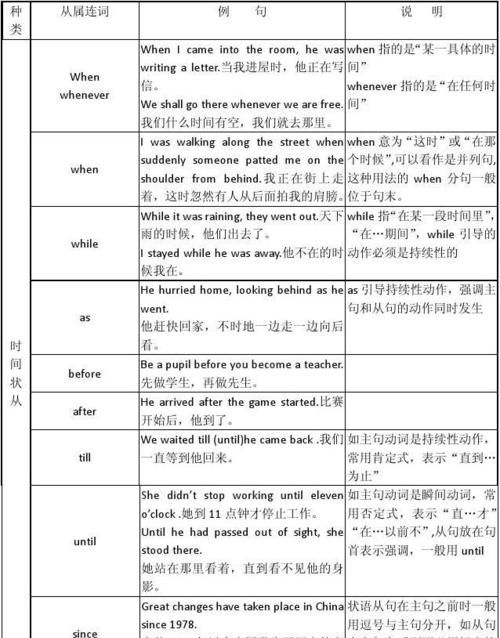本文目录
英语十大状语从句
·# 英语的十大状语
英语的状语按用途可以分为如下十一种,以后再学英语的过程中,碰到的状语必然在这十一种之间,这个只需简单了解即可。
总结下面,可以知道,可以做状语的语法成分有名词短语,如next month。介词短语如in physics,非谓语如causing severe flooding in that country等。
其中有些状语没有明确的区分,比如 To my amazement, he arrived on time. 令我惊异的是,他居然准时赶到了。 中 to my amazement这个难以准确说是什么状语,不过没关系,我们知道它是状语就尅了,这并不影响我们使用它!
在阅读英语文章时,如果你是刚入门的初级阅读者,那么状语可以不读,这样阅读就可以删繁就简,轻松上阵!
She is to be married next month . 她预定在下个月结婚。
这个简单,大家都懂。
He lives over the mountain. 他住在山的那一边。
注:地点状语除表位置外,还可以表“出发”“去向”“距离”等。如:
Are you glad to be going back to school? 返回学校你感到高兴吗?
They lived many miles from the town. 他们住的地方离镇子好几英里远。
She is very weak in physics. 她物理很不行。
China is very rich in natural resources. 中国自然资源丰富。
This is better in every way than that. 这个在哪一方面都比那个要好。
The bridge is 2500 meters in length and 150 meters in height. 这座桥长2500米,高150米。
这个一般人不太熟悉,方面状语嘛,就是说在哪一方面
He was surprised at what she said. 听到她说的话,他很吃惊。
He succeeded by hard work. 他由于努力工作而成功。
He was sent to prison for robbery. 他因为抢劫而坐牢。
Last week she fell ill from cold . 上星期她着凉生病了。
He talked his wife into buying a car . 他说服他妻子买一辆小汽车。
It rained heavily, causing severe flooding in that country . 大雨滂沱,造成了那个国家洪水泛滥。
He went to Africa in 1963, never to come back. 他在1963年到非洲,然后就再也没回来过了。
They went out for a walk . 他们出去散步了。
He saves on behalf of his son . 他为儿子存钱。
He stood aside for her to pass. 他靠边站让她过去。
He cupped his ear to hear better. 他的手捂着耳朵,以便听得更清楚。
He went to the south in search of a better life. 他去南方寻求更好的生活。
I went to France not to study French, but to study architecture. 我去法国不是为了学法语,而是为了学建筑。
Can you see without your glasses ? 你不戴眼镜能看得清东西吗?
United, we stand;divided, we fall. 团结则存,分裂则亡。
With more money I would be able to buy it. 钱多一点的话,我就买得起。
To look at him you could hardly help laughing. 看到他你就会忍不住笑起来。
We must be losing at least a third of our staff under new technology. 在新的技术条件下,我们必定要解雇至少三分之一的员工。
Weather permitting, we’ll have the match tomorrow. 天气允许的话,我们将于明天进行比赛。
For all his money , he’s a very lonely man. 他虽然富有,可是非常寂寞。
Carol went to work in spite of feeling ill. 卡洛尔尽管感到不舒服仍去上了班。
With all his efforts, he lost the match. 虽然尽了全力,他还是输了那场比赛。
You couldn’t do that to save your life. 你即使为了救自己的命也不能那样做。
Laughed at by everybody, he had my sympathy. 人人都嘲笑他,但我却同情他。
Knowing all this, they made me pay for the damage. 他们尽管了解这一切,还是要我赔偿损失。
I don’t like coffee very much . 我不太喜欢咖啡。
To a great extent, it is not fair. 在很大程度上,这是不公平的。
The system which is used in this school is very successful. 这个学校所施行的制度是非常成功的。
We came on the bus . 我们坐公共汽车来的。
You must pay the bill in cash. 你必须用现金付账。
I watched the game on television. 我在电视上收看了那场比赛。
We see with our eyes, and hear with our ears. 我们用眼睛看,用耳朵听。
I heard of the job through a newspaper advertisement. 我从报上的广告中知道了这个工作。
I slept with the window open . 我开着窗睡觉。
She said good-bye with tears in her eyes. 她含着泪水说再见。
He ran up to her breathing heavily. 他气喘吁吁地跑到她跟前。
He rushed into the room, his face covered with sweat . 他满脸是汗跑进屋来。

英语中省略的语法归纳
英语中的状语是用来修饰动词、形容词或副词等词的,那么你掌握了状语的语法知识吗?下面由我为大家整理的状语的语法知识,希望大家喜欢!
状语的语法知识归纳
状语(adverbial)是句子的重要修饰成分。状语是谓语里的另一个附加成分,它附加在谓语中心语的后面,从情况、时间、处所、方式、条件、对象、肯定、否定、范围和程度等方面对谓语中心进行修饰或限制。
一、副词作状语
Don't drive so fast.
别开得这么快。
二、介词短语作地点状语
We live in Hangzhou.
我们住在杭州。
三、名词作状语
The meeting lasted an hour.
会议开了一个小时。
状语从句的种类
1. 时间状语从句
常用引导词:when, as, while, as soon as, before, after, since , till, until
特殊引导词:the minute, the moment, the second, every time, the day,the instant, immediately , directly, no sooner „ than, hardly „when, scarcely „ when
I didn’t realize how special my mother was until I became an adult.
While John was watching TV, his wife was cooking.
The children ran away from the orchard(果园), the moment they saw the guard.
2. 地点状语从句
常用引导词:where
特殊引导词:wherever, anywhere, everywhere
Generally, air will be heavily polluted where there are factories.
Wherever you go, you should work hard.
地点状语从句一般由连接副词where, wherever等引导,已经形成了固定的句型,例如:
句型1:Where+地点从句,(there)+主句。
3. 原因状语从句
常用引导词:because, since, as, for
特殊引导词:seeing that, now that, in that, considering that, given that.
My friends dislike me because I’m handsome and successful.
Now that everybody has come, let’s begin our conference.
The higher income tax is harmful in that it may discourage people from trying to earn more.
4. 目的状语从句
常用引导词:so that, in order that
特殊引导词:lest, in case, for fear that,in the hope that, for the purpose that, to the end that
The boss asked the secretary to hurry up with the letters so that he could sign them. The teacher raised his voice on purpose that the students in the back could hear more clearly.
5. 结果状语从句
常用引导词:so „ that, such „ that,
特殊引导词:such that, to the degree that, to the extent that, to such a degree that,
He got up so early that he caught the first bus.
It’s such a good chance that we must not miss it.
To such a degree was he excited that he couldn’t sleep last night.
6. 条件状语从句
常用引导词:if, unless,
特殊引导词:as/so long as, only if, providing/provided that, supposing that, in case that, on condition that
We’ll start our project if the president agrees.
You will certainly succeed so long as you keep on trying.
Provided that there is no opposition, we shall hold the meeting here.
7. 让步状语从句
常用引导词:though, although, even if, even though
特殊引导词: as(用在让步状语从句中必须要倒装),while ( 一般用在句首 ),no matter „, in spite of the fact that, while, whatever, whoever, wherever, whenever, however, whichever
Much as I respect him, I can’t agree to his proposal.
尽管我很尊敬他, 我却不同意他的建议。
The old man always enjoys swimming even though the weather is rough.
No matter how hard he tried, she could not change her mind.
He won’t listen whatever you may say.
8. 比较状语从句
常用引导词:as(同级比较), than(不同程度的比较)
特殊引导词:the more „ the more „ ; just as „, so„; A is to B what /as X is to Y; no „ more than; not A so much as B
She is as bad-tempered as her mother.
The house is three times as big as ours.
The more you exercise, the healthier you will be.
Food is to men what oil is to machine. 食物之于人,犹如油之于机器。
9. 方式状语从句
常用引导词:as, as if, how
特殊引导词:the way
When in Rome, do as the Roman do.
She behaved as if she were the boss.
Sometimes we teach our children the way our parents have taught us.
状语的排列顺序
在句首时,依次为:时间状语-地点状语-频度副词作状语
在句末时,依次为:方式状语-频度副词作状语-地点状语-时间状语

英语状语的用法总结
状语说明地点、时间、原因、目的、结果、条件、方向、程度、方式和伴随状况等。那么你对英语状语的使用方法了解多少呢?以下是由我整理关于英语状语的用法的内容,希望大家喜欢!

英语状语的用法
状语一般由副词、介词短语、分词和分词短语、名词、不定式或相当于副词的词或短语来担当。其位置一般放在句末,但也可放在句首或句中。
副词是一种用来修饰动词,形容词,副词或全句的词,说明时间,地点,程度,方式等概念。
1.副词一般在句子中做状语
He speaks English very well. 他英语说得非常好。
其中的“very”是程度副词,用来修饰“well”。“very well”是修饰“speak”的程度状语。
2. 不定式在句子中可以作目的状语
I come specially to see you. 我专门来看你。
3.介词短语
Ten years ago, She began to live in Dalian.
从十年以前开始,她开始住在了大连。
The boy was praised for his bravery.
这个男孩因为他的勇敢而被夸奖。
4.从句作状语
When she was 12 years old, she began to live in Dalian.
她12岁的那一年开始居住于大连。
If I am not busy tomorrow, I will play football with you.
如果我明天不忙,我就会陪你踢足球。
5.分词作状语
Having had a quarrel with his wife, he left home in a bad temper。
由于和妻子吵了一架,他愤怒的离开了家。
Inhibited in one direction, it now seems that the Mississippi is about to take another.
看样子密西西比河将要改变流向了,因为它的一个方向被阻碍了。
6.名词作状语
We must get together again some day.
将来某天我们必能再相聚.
we should serve people heart and soul.
我们应该全心全意地服务
英语状语的运用
写作中能合理、正确地使用状语从句,不但能地道的表达英文习惯,而且还能使文体结构更加严谨、美观。例如下文:
My hobby
The hobby I enjoy most is fishing.
I started fishing (1)when I was five years old. I’ll never forget the day (2)when my father first took me fishing with him. On that day, I was holding a fishing rod (3)when a fish suddenly started pulling on the line. (4)I was so shocked that I fell into the water. But experience didn’t put me off and I have been fishing ever since.
Now I still go fishing with my father. And we often go out on Sundays and spend the whole day fishing in the river.
(1)是由when引导的时间状语从句,这列从句的使用频率很高。
(2)句是由I’ll never forget the day .及when my father first took me fishing with him.两局组成。When在从句中做时间状语。
(3)句也是由when 引导的时间状语从句。When 常与suddenly 连用,主句常用过去进行是。译为 “正在……, 忽然……”.
英语里状语的定义和用法是什么意思
英语中的状语用来修饰动词、形容词或副词,主要由副词、介词短语、动词不定式、分词充当,或由连词引导状语从句,表示时间、地点、程度、目的、方式,比较、让步、条件、原因、结果、伴随等。 (1) 时间状语 I often get up at 5:30 in the morning. 我常常在早上5:30起床。 Hearing the news, they felt very excited. 听到这个消息,他们感到很兴奋。 Go along this street until you reach the end. 沿着这条街走直到到达尽头为止。 (2) 地点状语 Pandas only live in China. 熊猫仅生活在中国。 You should put the book where it was. 你应该把这本书放回原来的地方。 (3) 程度状语 He read very carefully. 他读得很他仔细。 I have quite a lot of work to do. 我有相当多的工作要做。 (4) 目的状语 We’ll go to the beach for a picnic this Sunday. 这个星期天我们将去沙滩野炊。 He took some change from his pocket to buy a newspaper. 他从口袋里掏出一些零钱来买报纸。 She got up early so that she could catch the first bus. 她早早地起床,以便能够赶上这辆早班车。 (5) 方式状语 We usually go to school on foot. 我们通常步行去上学。 Please do it as I told you. 请按我告诉你的去做。 (6) 让步状语 Though she has a lot of money, she is unhappy. 虽然她很有钱,而她并不幸福。 No matter what happens, I will never lose heart. 无论发生什么,我将决不失去信心。 (7) 条件状语 If you don’t work hard, you’ll fall behind the others. 假如你不努力学习,你将落后于别人。 Given more attention, the flowers would have grown better. 如果给予更多的关心的话,这些花将长得更好。 (8) 比较状语 Your watch is not the same as mine. 你的手表与我的不一样。 Mike is not as (so) tall as Jack. 迈克不及杰克高。 (9) 原因状语 We didn’t go to the park because of the bad weather. 由于天气不好,我们没有去公园。 I’m glad to meet you. 见到你我很高兴(from ***)。 Being ill, he didn’t go to school. 由于病了,他没有去上学。 (10) 结果状语 The wind was so strong that we could hardly move forward. 风是如此地猛烈,以致于我们寸步难行。 He left early, so that he caught the train. 他早早地离去,(结果) 因此赶上了火车。 (11) 伴随状语 The doctor hurried off, with a medicine box under his arm. 这位医生匆匆离去,胳膊下夹着一个药箱子。 The teacher came into the classroom, followed by a group of his students. 老师进到教室里来,后面跟着一群学生。

以上就是关于英语种状语的用法,英语十大状语从句的全部内容,以及英语11种状语的用法 的相关内容,希望能够帮到您。
